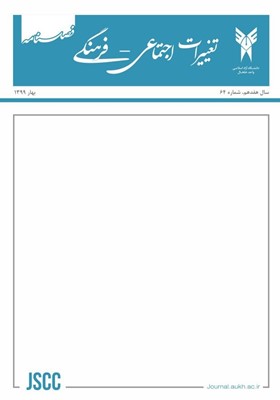بررسی آثار اجتماعی و اقتصادی پیاده سازی کارت هوشمند ملّی در استان اردبیل
محورهای موضوعی : خانوادهسید عیسی کریم پور کلوری 1 , صمد عابدینی 2
1 - دانشجوی دکتری جامعه شناسی، واحد خلخال، دانشگاه آزاد اسلامی، خلخال، ایران
2 - عضو هیأت علمی گروه علوم اجتماعی، واحد خلخال،دانشگاه آزاد اسلامی، خلخال، ایران.
کلید واژه: رضایت شهروندان, کارت هوشمند ملّی, ارزیابی تأثیرات اجتماعی, آگاهی شهروندان,
چکیده مقاله :
پژوهش حاضر با هدف بررسی آثار اجتماعی و اقتصادی پیاده سازی کارت هوشمند ملّی در استان اردبیل انجام گرفته است. چهارچوب نظری پژوهش حاضر بر اساس نظریات حوزه جامعهشناسی ارتباطات نظیر نظریه جامعه اطلاعاتی هربرت شیلر، اطلاعات و تغییر شهری مانوئل کاستلز و جامعه اطلاعاتی دانیل بل میباشد. این تحقیق به روش پیمایش و با استفاده از تکنیک پرسشنامه و سوات (SWOT) انجام گرفته است. جامعه مورد بررسی در بخش پیمایش شهروندان استان اردبیل بودند که از میان آنها با استفاده از فرمول کوکران تعداد 386 نفر بهعنوان حجم نمونه انتخاب گردید و در بخش سوات (SWOT) جامعه آماری تحقیق، سازمان ثبت احوال (اداره کل ثبت احوال استان و ادارات ثبت احوال در شهرستانها) بود. برای انجام تحقیق از میان 12 اداره ثبت احوال در استان که اقدام به هوشمند سازیکارت ملّی کردهاند، 6 اداره به روش تصادفی ساده انتخاب و برای آنها پرسشنامه ارسال شد که 50 نفر از مدیران ارشد این سازمان در استان به شناسایی نقاط ضعف، قوت، فرصتها و تهدیدات طرح هوشمند سازی کارت ملّی در استان اردبیل پرداختند که نتایج زیر حاصل گردید. در بخش نقاط قوت طرح کارشناسان به ترتیب اولویت، وجود سازمان متمرکزی برای ساماندهی به امور هویتی در کشور، قرار گرفتن اطلاعات اشخاص بهصورت پایگاه داده درون کارت، در بخش نقاط ضعف به ترتیب اولویت، نبود کد پستی بر روی کارت، کیفیت پایین عکس بر روی کارت، در بخش فرصتها آسانسازی تجارت در فضای مجازی مطمئن و آسان، زمینهسازی ایجاد دولت الکترونیک و در بخش تهدیدها، در رتبه نخست کاهش ضریب اطمینان بخاطر واگذاری طرح به دفاتر پیشخوان، و در رتبه دوم با در اختیار گرفتن کارت شخص دیگر و ورود بهحساب کاربری ایشان میتوان بر علیه وی اقداماتی انجام داد، شناسایی گردید.
The present research was conducted with the aim to Investigating the social and economic effects of implementing the national smart card in Ardabil province. Theoretical framework of this research is based on theories of sociological realm of communications such as informational society of Herbert Shiler, information and urban change of Manuel Castels, and informational society of Daniel Bel. This research has been done by survey method using questionnaire and SWOT technique. The statistical universe in the survey part consisted of Ardebil citizens from among whom 386 individuals were selected as sample size, while in SWOT part the statistical universe consisted of the registration of personal status organization (general department in Ardebil and other branches in other cities of the province). Six departments who had started giving smart national cards were randomly selected from among twelve departments of the province and questionnaires were given to them. Fifty senior managers of that organization in Ardebil province attempted to identify the weaknesses, opportunities, threats, and strengths of national smart card plan in the province and the following results were obtained: the strengths consisted of the presence of a central organization dedicated to identity cases in the country, and location of personal information in the form of data base inside the card. Weaknesses consisted of lack of post code on the cards, and low quality of pictures on the cards. In the part of opportunities, the increase in social security resulted from the regulation of personal information, and creating necessary background for electronic government were remarkable. And finally in the part of threats, the possibility of misuse of the cards because of location of some cities of the province in the border regions, and In the second place, by taking another person's card and logging in to their user account, its possible that actions were taken against her, were identified as noteable cases.
_||_


